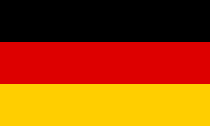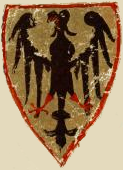 Global Information
Global InformationGerman nationalism information


German nationalism (German: Deutscher Nationalismus) is an ideological notion that promotes the unity of Germans and of the Germanosphere into one unified nation-state. German nationalism also emphasizes and takes pride in the patriotism and national identity of Germans as one nation and one people. The earliest origins of German nationalism began with the birth of romantic nationalism during the Napoleonic Wars when Pan-Germanism started to rise. Advocacy of a German nation-state began to become an important political force in response to the invasion of German territories by France under Napoleon Bonaparte.
In the 19th century, Germans debated the German question over whether the German nation-state should comprise a "Lesser Germany" that excluded the Austrian Empire or a "Greater Germany" that included the Austrian Empire or its German speaking-part.[1] The faction led by Prussian Chancellor Otto von Bismarck succeeded in forging a Lesser Germany.[1]
Aggressive German nationalism and territorial expansion was a key factor leading to both World Wars. Prior to World War I, Germany had established a colonial empire in hopes of rivaling Britain and France. In the 1930s, the Nazis came to power and sought to unify all ethnic Germans under the leadership of Adolf Hitler eventually leading to the extermination of Jews, Poles, Romani, and other people deemed Untermenschen (subhumans) in the Holocaust during World War II.
After the defeat of Nazi Germany, the country was divided into East and West Germany in the opening acts of the Cold War, and each state retained a sense of German identity and held reunification as a goal, albeit in different contexts. The creation of the European Union was in part an effort to harness German identity to a European identity. West Germany underwent its economic miracle following the war, which led to the creation of a guest worker program; many of these workers ended up settling in Germany which has led to tensions around questions of national and cultural identity, especially with regard to Turks who settled in Germany.
German reunification was achieved in 1990 following Die Wende; an event that caused some alarm both inside and outside Germany. Germany has emerged as a great power inside Europe and in the world; its role in the European debt crisis and in the European migrant crisis have led to criticism of German authoritarian abuse of its power, especially with regard to the Greek debt crisis, and raised questions within and outside Germany as to Germany's role in the world.
Due to post-1945 repudiation of the Nazi regime and its atrocities, German nationalism has been generally viewed in the country as taboo[2] and people within Germany have struggled to find ways to acknowledge its past but take pride in its past and present accomplishments; the German question has never been fully resolved in this regard. A wave of national pride swept the country when it hosted the 2006 FIFA World Cup. Far-right parties that stress German national identity and pride have existed since the end of World War II but have never governed.
According to the Correlates of War project, patriotism in Germany before World War I ranked at or near the top, whereas today it ranks at or near the bottom of patriotism surveys.[3] However, there are also other surveys according to which modern Germany is indeed very patriotic.[4][5][6]
- ^ a b Verheyen 1999, pp. 8.
- ^ Motyl 2001, pp. 190.
- ^ "Correlates of War – The Correlates of War Project". correlatesofwar.org. Retrieved 1 November 2022.
- ^ . 5 October 2016 https://web.archive.org/web/20161005112907/http://www.identity-foundation.de/images/stories/downloads/Studie_Deutsch-Sein_final_klein.pdf. Archived from the original (PDF) on 5 October 2016. Retrieved 22 March 2023.
{{cite web}}: Missing or empty|title=(help) - ^ "Stolz Deutscher zu sein". Statista (in German). Retrieved 22 March 2023.
- ^ Greenwood, Shannon (5 May 2021). "5. National pride and shame". Pew Research Center's Global Attitudes Project. Retrieved 22 March 2023.